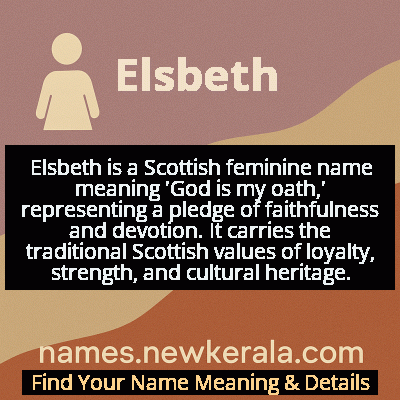Elsbeth Name Meaning & Details
Origin, Popularity, Numerology Analysis & Name Meaning of Elsbeth
Discover the origin, meaning, and cultural significance of the name ELSBETH. Delve into its historical roots and explore the lasting impact it has had on communities and traditions.
Name
Elsbeth
Gender
Female
Origin
Scottish
Lucky Number
8
Meaning of the Name - Elsbeth
Elsbeth is a Scottish feminine name meaning 'God is my oath,' representing a pledge of faithfulness and devotion. It carries the traditional Scottish values of loyalty, strength, and cultural heritage.
Elsbeth - Complete Numerology Analysis
Your Numerology Number
Based on Pythagorean Numerology System
Ruling Planet
Saturn
Positive Nature
Ambitious, efficient, realistic, and authoritative.
Negative Traits
Materialistic, stressed, confrontational, and can be overly ambitious.
Lucky Colours
Dark blue, black.
Lucky Days
Saturday.
Lucky Stones
Blue sapphire, amethyst.
Harmony Numbers
2, 4, 6.
Best Suited Professions
Business leaders, managers, financial services, law enforcement.
What People Like About You
Leadership, determination, organizational skills.
Famous People Named Elsbeth
Elsbeth of the Forest
Scottish noblewoman
Known for her patronage of Scottish monasteries and preservation of Gaelic cultural traditions
Elsbeth MacGregor
Educator and writer
Founded one of the first schools for girls in the Scottish Highlands and authored Gaelic educational texts
Elsbeth Campbell
Botanist
Documented and preserved rare Scottish Highland plant species, establishing several conservation gardens
Elsbeth Fraser
Musician
Award-winning Scottish folk singer and composer who revived traditional Gaelic melodies
Name Variations & International Equivalents
Click on blue names to explore their detailed meanings. Gray names with will be available soon.
Cultural & Historical Significance
The name carries echoes of Scotland's complex religious history, bridging pre-Reformation Catholic traditions with later Presbyterian influences. Many early Scottish Elsbeths were recorded in monastic records and clan genealogies, often appearing in families with strong ties to both Gaelic culture and the broader European Christian tradition. The name's persistence through centuries of linguistic and cultural change demonstrates its deep roots in Scottish identity, representing a bridge between ancient Celtic traditions and mainstream European naming practices.
Throughout Scottish history, women named Elsbeth often appear in records as keepers of local traditions, healers, and community leaders. The name embodies the Scottish virtues of resilience, faithfulness, and quiet strength that have characterized many Scottish women through challenging historical periods including the Clearances, industrialization, and cultural assimilation pressures.
Extended Personality Analysis
Women named Elsbeth are often perceived as possessing a quiet strength and steadfast reliability that reflects the name's Scottish heritage. They tend to be practical, grounded individuals with a deep sense of loyalty to family and tradition, yet maintain an independent spirit that allows them to navigate modern challenges while honoring their roots. This combination of traditional values and personal resilience makes Elsbeths natural leaders in their communities, often serving as the steady center around which others gather.
Typically, Elsbeths demonstrate a thoughtful, analytical approach to problem-solving, preferring careful consideration to impulsive action. They possess a strong moral compass and are known for keeping their promises, living up to the name's meaning of being 'pledged to God.' While they may appear reserved at first meeting, those who know them well appreciate their dry wit, keen intelligence, and the depth of their commitment to causes and people they care about.
Their personality often blends Scottish pragmatism with a subtle creative streak, making them both reliable and innovative. Elsbeths tend to be excellent listeners and thoughtful advisors, drawing on both traditional wisdom and contemporary understanding. They typically value authenticity over appearance and substance over show, embodying the Scottish characteristic of speaking plainly but meaning deeply. This makes them trusted friends and respected colleagues who build lasting relationships through consistent, genuine interaction.
Modern Usage & Popularity
In contemporary times, Elsbeth has experienced a modest revival as part of the broader trend toward traditional and heritage names, particularly in Scotland and among Scottish diaspora communities. While it remains relatively uncommon compared to its parent name Elizabeth, it has gained appeal among parents seeking a name that is both traditional and distinctive. The name appears more frequently in Scotland than in other English-speaking countries, maintaining its regional character. Recent years have seen increased usage in birth registrations, particularly in the Scottish Highlands and Islands, where there's growing interest in preserving Gaelic and Scots naming traditions. It ranks outside the top 500 names in most English-speaking countries but shows steady, consistent usage rather than dramatic popularity swings. Modern Elsbeths often appreciate their name's connection to Scottish heritage while finding it practical for international contexts, as it's recognizable but not overly common.
Symbolic & Spiritual Meanings
Symbolically, Elsbeth represents the enduring strength of cultural identity and the preservation of tradition in the face of change. The name embodies the concept of faithful commitment—not just in the religious sense of its etymology, but as a metaphor for staying true to one's roots and values. It carries connotations of resilience and adaptation, mirroring Scotland's own history of maintaining distinct cultural identity while engaging with broader influences. The name also symbolizes the bridge between ancient and modern, rural and urban, Gaelic and English-speaking Scotland. In a metaphorical sense, Elsbeth represents the quiet, steady force that preserves what matters most—family, heritage, and personal integrity—through generations of social transformation. The name suggests someone who honors the past while engaging constructively with the present, embodying the wisdom that comes from understanding one's place in a long continuum of history and culture.

